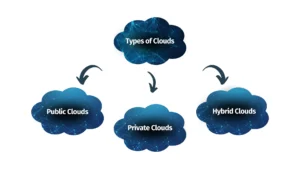In today’s fast-paced, technology-driven world, small and medium enterprises (SMEs) are constantly looking for ways to streamline their operations, reduce costs, and stay competitive. Cloud computing has emerged as a transformative solution for SMEs, providing them with the flexibility, scalability, and efficiency needed to thrive in an increasingly digital landscape. By leveraging cloud-based services, businesses can access powerful tools and resources that were once only available to larger enterprises with extensive IT budgets.
In this article, we’ll explore the key benefits of cloud computing for small and medium enterprises, focusing on how it enhances operations, improves security, and fosters growth opportunities.
1. Cost Efficiency and Reduced IT Infrastructure Costs
1.1 Lower Capital Expenditure
One of the primary reasons small and medium enterprises (SMEs) adopt cloud computing is the significant reduction in upfront capital expenditure. Traditional IT infrastructures require heavy investments in servers, data storage systems, software licenses, and IT personnel to maintain and manage them. In contrast, cloud computing offers a pay-as-you-go model, meaning businesses only pay for the services they use.
This approach allows SMEs to avoid purchasing expensive hardware and software, which helps them conserve capital for other areas of the business. For instance, cloud platforms like Amazon Web Services (AWS), Microsoft Azure, and Google Cloud provide affordable, scalable solutions that can be tailored to a company’s specific needs.
1.2 Reduced Maintenance Costs
With cloud computing, the responsibility for maintaining hardware and software lies with the cloud service provider, not the SME. This means that businesses can avoid the costs associated with maintaining servers, troubleshooting, and upgrading hardware and software. Additionally, cloud providers handle all updates and patches, ensuring that systems remain secure and up-to-date without requiring additional resources from the business.
2. Scalability and Flexibility
2.1 On-Demand Resources
One of the standout advantages of cloud computing is its scalability. SMEs can easily adjust their computing resources based on their current needs, whether they’re experiencing growth or facing temporary downturns. Cloud platforms allow businesses to scale up or down without the need for complex IT changes or additional infrastructure investments.
For example, if a business experiences an increase in demand, it can quickly add more computing power, storage space, or bandwidth to accommodate the surge. Conversely, if demand drops, they can scale back resources to avoid paying for unused capacity. This on-demand flexibility ensures that SMEs only pay for what they need, providing a highly cost-effective way to manage their IT infrastructure.
2.2 Global Reach
Cloud computing also provides SMEs with the ability to expand their reach beyond their local markets. Cloud-based applications and services can be accessed from anywhere in the world, allowing businesses to expand their operations without the limitations of physical infrastructure. For SMEs looking to enter global markets or collaborate with remote teams, this accessibility is crucial.
3. Enhanced Collaboration and Productivity
3.1 Real-Time Collaboration
Cloud computing enables businesses to access data and applications in real-time from any device with an internet connection. This fosters collaboration among team members, even if they are working remotely or across different geographical locations. For example, cloud-based tools such as Google Workspace, Microsoft 365, and Slack allow employees to work together on documents, spreadsheets, and presentations in real-time, making it easier to share ideas, track changes, and keep projects moving forward.
This increased collaboration enhances overall productivity, as teams can communicate more efficiently, avoid delays, and work on tasks simultaneously, irrespective of their location. As a result, SMEs can accelerate project timelines and improve decision-making processes.
3.2 Centralized Data Access
With cloud computing, all business data is stored in a centralized location, making it easy for employees to access and share important files and information. This centralized data storage not only improves collaboration but also reduces the risk of data silos, where information is trapped in different departments or locations. Whether employees are working from the office, home, or on the go, they can quickly access the latest versions of documents and business-critical information.
4. Improved Security and Data Backup
4.1 Robust Data Security
Security is a critical concern for businesses of all sizes, and SMEs are no exception. Cloud service providers offer advanced security features, such as data encryption, multi-factor authentication, and security monitoring, which are often out of reach for smaller businesses with limited IT budgets. These security features help protect sensitive business data from cyberattacks and unauthorized access.
Many cloud providers also offer compliance with industry standards and regulations, such as GDPR, HIPAA, and SOC 2, ensuring that SMEs meet legal requirements for data protection and privacy. This can be particularly important for businesses in regulated industries like healthcare, finance, and legal services.
4.2 Automated Data Backup and Disaster Recovery
Cloud computing also provides SMEs with reliable data backup and disaster recovery solutions. Cloud services typically offer automatic data backups, meaning businesses don’t need to worry about manual backups or losing important information. If a disaster strikes, such as a server failure or cyberattack, businesses can quickly restore their data from the cloud, ensuring minimal downtime and business continuity.
Disaster recovery in the cloud is generally more cost-effective than traditional methods, as businesses can avoid investing in physical backup systems and redundant data centers. Cloud-based disaster recovery solutions allow SMEs to protect their data without incurring significant additional costs.
5. Access to Advanced Technologies
5.1 Artificial Intelligence and Machine Learning
Cloud computing also enables small and medium enterprises to leverage advanced technologies such as artificial intelligence (AI) and machine learning (ML). In the past, these technologies were reserved for large organizations with substantial resources. However, through cloud platforms, SMEs can now access AI and ML tools to enhance their operations, improve customer experiences, and gain valuable insights from data.
For example, cloud-based AI tools can help SMEs analyze customer behavior, automate routine tasks, predict trends, and personalize marketing campaigns. This allows smaller businesses to compete with larger enterprises by leveraging the same cutting-edge technologies, often without the need for specialized expertise.
5.2 Advanced Analytics and Big Data
Cloud computing also allows SMEs to access powerful data analytics tools that can help them make data-driven decisions. Cloud platforms provide access to Big Data processing capabilities and analytics tools that were once too complex or expensive for smaller businesses to use. By analyzing large sets of data, businesses can uncover insights into customer preferences, optimize operations, and forecast market trends.
This can provide SMEs with a competitive edge, enabling them to understand their market better and make informed decisions faster.
6. Improved Customer Service
6.1 Enhanced Communication Channels
Cloud computing offers a variety of customer service tools, such as cloud-based call centers, chatbots, and help desk software, which allow SMEs to deliver better customer experiences. These tools enable businesses to communicate with customers seamlessly through multiple channels, including phone, email, chat, and social media, all while maintaining a central repository of customer interactions.
By using cloud-based communication platforms, businesses can respond to customer inquiries faster, resolve issues more effectively, and enhance overall customer satisfaction. Moreover, the scalability of these solutions means that businesses can easily adapt to changes in customer demand without needing to invest in additional infrastructure.
6.2 Personalization and CRM
Cloud-based customer relationship management (CRM) systems, such as Salesforce and HubSpot, allow SMEs to track and manage customer interactions, sales, and support inquiries. These tools help businesses gain a better understanding of customer needs and preferences, enabling them to personalize their communications and offers.
This personalized approach can lead to stronger customer loyalty, increased sales, and improved customer retention, all of which are essential for the growth of small and medium enterprises.
7. Environmental Sustainability
7.1 Reduced Carbon Footprint
Cloud computing can also contribute to a business’s sustainability efforts. By moving to the cloud, SMEs can reduce the need for on-site data centers, which consume significant amounts of energy. Cloud providers operate large, energy-efficient data centers that use advanced technologies to reduce power consumption and minimize their environmental impact.
Furthermore, many cloud providers are committed to sustainability by utilizing renewable energy sources and implementing environmentally friendly practices. By adopting cloud services, SMEs can not only reduce their carbon footprint but also align themselves with consumer preferences for businesses that prioritize sustainability.
Conclusion
Cloud computing offers a wide range of benefits for small and medium enterprises, enabling them to operate more efficiently, reduce costs, and access advanced technologies. From cost savings and scalability to enhanced security and the ability to leverage AI and data analytics, cloud computing is a powerful tool for businesses looking to stay competitive in a digital-first world.
By embracing cloud-based solutions, SMEs can streamline their operations, improve collaboration, and focus on what matters most—growing their business. With more flexible, affordable, and secure options than ever before, cloud computing has become a game-changer for small and medium enterprises, allowing them to compete on a level playing field with larger companies.




